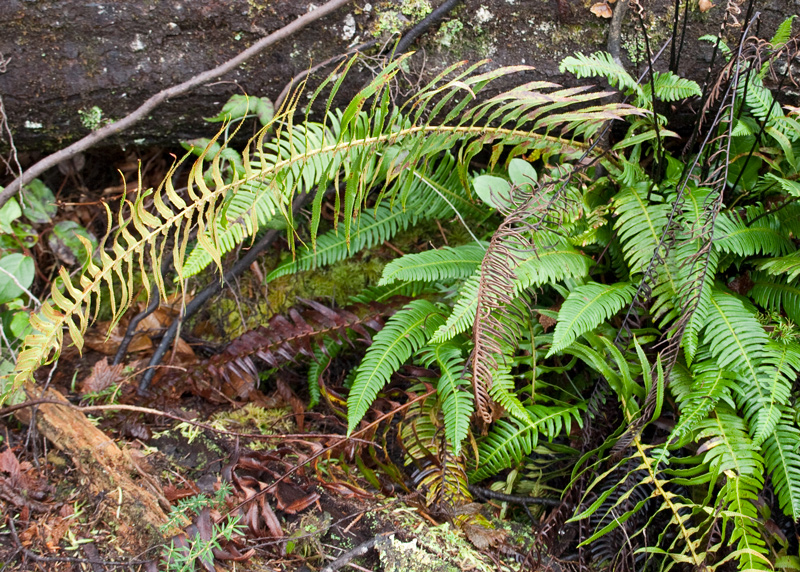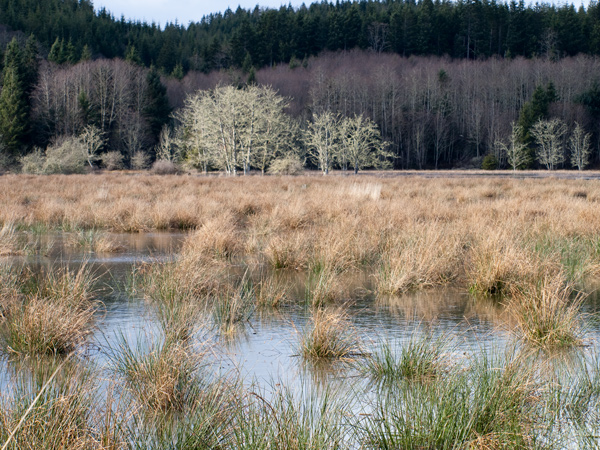At Fort Clatsop near the Pacific Ocean, visiting Indians inform the captains that a Captain “More” had visited in a vessel with three cows. One of the enlisted men trades tobacco for a sea otter skin, and Lewis describes local ferns and grasses.
Captain Moore’s Cows
by Yellowstone Public Radio[1]Originally aired weekdays by Yellowstone Public Radio during the Bicentennial observance of 2003-2006. Narrated by Hal Hansen. Scripts by Whit Hansen and Ed Jacobson. Produced by Leni Holliman. © … Continue reading
Sword and Deer Ferns
Western Sword Fern and Deer Fern
Polystichum munitum and Struthiopteris spicant, syn. Blechnum spicant
Fort-to-Sea Trail, 17 December 2010. © by Kristopher K. Townsend. Permission to use granted under the Creative Commons Attribution-Share Alike 4.0 International license.
There are also two species of firn which are common to this country beside that formerly discribed of which the natives eat the roots. these from their disparity in point of size I shall designate the large and small firn. both species continue green all winter.—
—Meriwether Lewis
Captain Moore’s Cows
these people have also informed us that one More who sometimes touches at this place and trades with the natives of this coast, had on board of his vessel three Cows, and that when he left them he continued his course along the N. W. coast. I think this strong circumstancial proof that there is a stettlement of white persons at Nootka sound or some point to the N. W. of us on the coast.
—Meriwether Lewis
The Enlisted Men’s Day
one of the men bought a Sea otter Skin from the Indian for a peace of Tobacco not the half of a carrit.
—John Ordwaythe Men at the fort were employed making of Moccasins & mending their Cloathing &ca.
—Joseph Whitehouse
Sedges and Grasses
Tidal Marsh
Fort Clatsop, Netul Landing
© 20 December 2010 by Kristopher K. Townsend. Permission to use granted under the Creative Commons Attribution-Share Alike 4.0 International license.
The grasses of this neighbourhood are generally coase harsh and sedge-like, and grow in large tufts. there is none except in the open grounds. near the coast on the tops of some of the untimbered hills there is a finer and softer species which resembles much the green swoard. the salt marshes also produce a coarse grass, Bull rushes and the Cattail flagg. the two last the natives make great use in preparing their mats bags &c.—
—Meriwether Lewis
Weather Diary
aspect of the weather at rise
Wind at rise
aspect of the weather at 4 OC1 P.M. Wind at 4 O’Clock P.M. cloudy after rain S. W. cloudy after rain S. W. Wind very hard last evening and all night
—Meriwether Lewis[2]To assist the reader, the editor of this web page has omitted the “Day of ye Month” column and spelled out some abbreviations.
Experience the Lewis and Clark Trail
The Lewis and Clark Trail Experience—our sister site at lewisandclark.travel—connects the world to people and places on the Lewis and Clark Trail.
Plan a trip related to February 13, 1806:

Fort Clatsop is a High Potential Historic Site along the Lewis and Clark National Historic Trail managed by the U.S. National Park Service. The site is managed by the Lewis and Clark National and State Historic Parks.
Notes
| ↑1 | Originally aired weekdays by Yellowstone Public Radio during the Bicentennial observance of 2003-2006. Narrated by Hal Hansen. Scripts by Whit Hansen and Ed Jacobson. Produced by Leni Holliman. © 2003 by Yellowstone Public Radio. |
|---|---|
| ↑2 | To assist the reader, the editor of this web page has omitted the “Day of ye Month” column and spelled out some abbreviations. |




